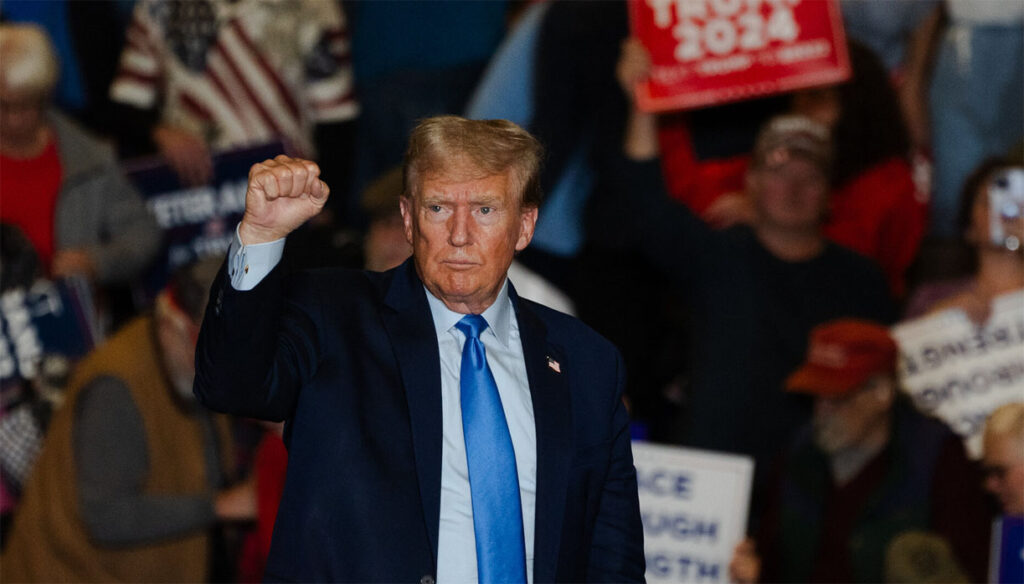In a significant legal development with far-reaching implications for the 2024 presidential election, the Michigan Supreme Court has decided to keep former President Donald Trump on the state’s primary ballot. This decision stands in stark contrast to a recent ruling from the Colorado Supreme Court, which had removed Trump from its ballot in base on his alleged involvement in the January 6 Capitol protest, accusing him of “insurrection.”
The Michigan Supreme Court’s rejection of the case to remove Trump was grounded in procedural and legal technicalities specific to Michigan law. A pivotal point in their decision was the absence of a Michigan law equivalent to that in Colorado, which requires presidential candidates to affirm their legal qualifications.
In her analysis, Justice Elizabeth Welch from Michigan elucidated this crucial difference. She noted, “The anti-Trump challengers have identified no analogous provision in the Michigan Election Law that requires someone seeking the office of President of the United States to attest to their legal qualification to hold the office.” This emphasis on state-specific legal frameworks was central to Michigan’s decision.
Further, the Michigan court’s approach was significantly procedural. The state’s Court of Claims judge, in the initial stages of the lawsuit, opined that Michigan law does not empower election officials to vet the eligibility of presidential primary candidates.
This perspective was subsequently upheld by higher courts. The judge’s assertion that the case posed a political question beyond the purview of the judiciary also played a role in its dismissal. The Michigan Court of Appeals reinforced this view, stating, “At the moment, the only event about to occur is the presidential primary election. But as explained, whether Trump is disqualified is irrelevant to his placement on that particular ballot.”
This procedural stance contrasts with Colorado, where the courts engaged more directly with the substantive issues at hand, particularly Trump’s alleged involvement in the January 6 insurrection and its implications under the U.S. Constitution’s “insurrectionist ban”.
The 14th Amendment of the Constitution, ratified after the Civil War, stipulates that officials who swear to uphold the Constitution and then engage in insurrection are barred from holding future office. This amendment, historically used to prevent Confederates from returning to federal office, has rarely been invoked in modern times and its applicability to the presidency remains a legal gray area – especially in light of who is accusing Trump of “insurrection” and the fact that he has been convicted of nothing.
Justice Welch, in her writing, also noted the potential for future legal battles, stating, “I would affirm the Court of Appeals’ ruling on this issue, which still allows appellants to renew their legal efforts as to the Michigan general election later in 2024 should Trump become the Republican nominee for President of the United States or seek such office as an independent candidate.” This acknowledgment suggests that the legal saga may not be over, especially if Trump secures the Republican nomination.
The Michigan Supreme Court’s decision, while a current victory for Trump, opens the door to a myriad of legal interpretations and potential challenges in other states. The case underscores the complexities involved when state laws intersect with federal constitutional provisions, particularly in the politically charged context of presidential eligibility. The contrasting outcomes in Michigan and Colorado also hint at the possibility of these issues eventually escalating to the U.S. Supreme Court, which might be called upon to provide a definitive interpretation, especially as the nation hurtles towards the 2024 primaries.
In summary, the Michigan Supreme Court’s decision was legal “punt” that did not deal with the fact that Trump is only being accused of “insurrection” by the opposing political party – NOT by a court of law or any due process whatsoever.
This begs the question: Since when does an opposing political party get to gratuitously charge a candidate with a crime and remove them from a ballot?
